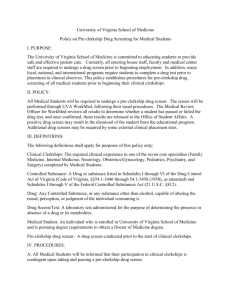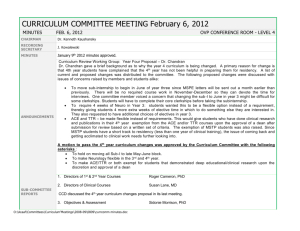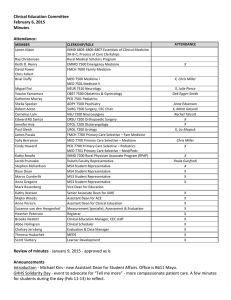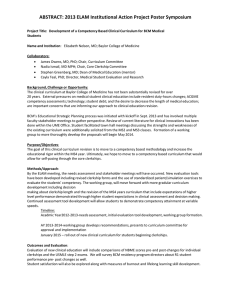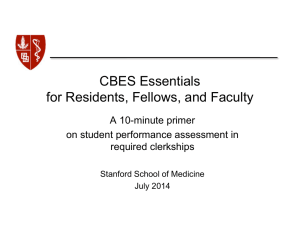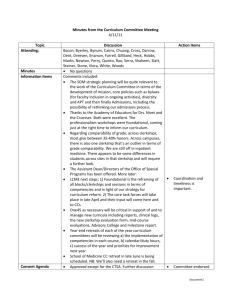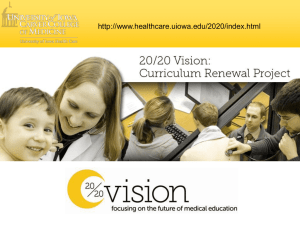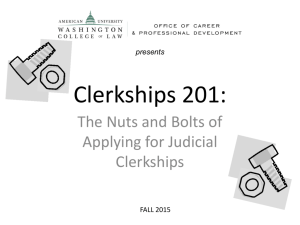word - Dartmouth Medical School
advertisement
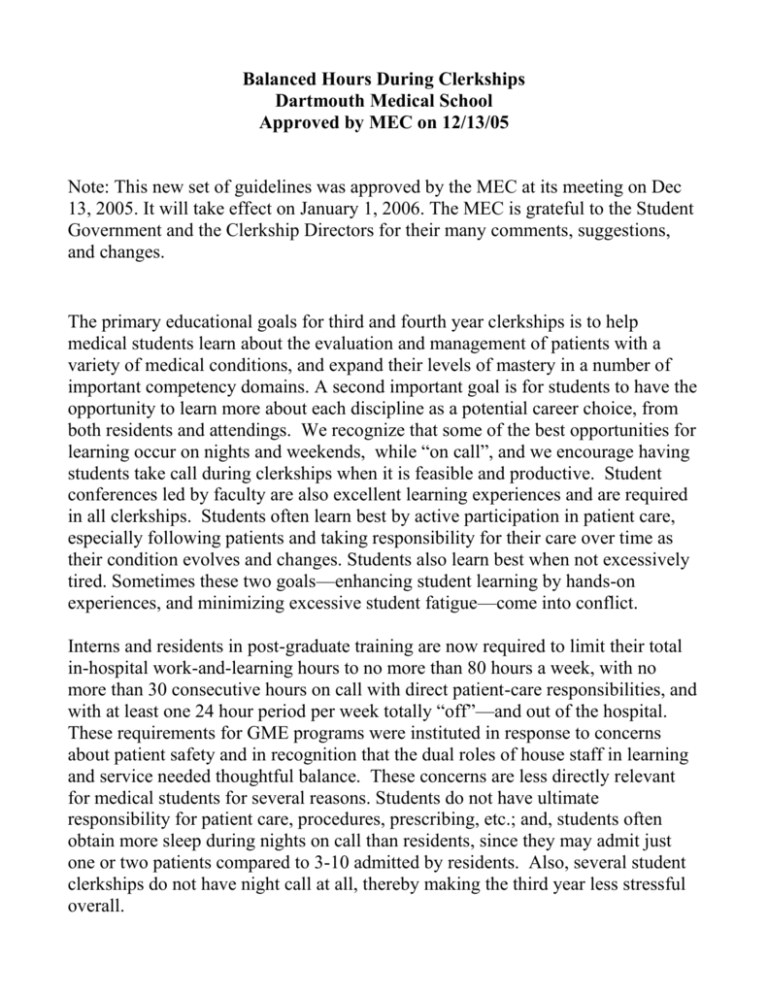
Balanced Hours During Clerkships Dartmouth Medical School Approved by MEC on 12/13/05 Note: This new set of guidelines was approved by the MEC at its meeting on Dec 13, 2005. It will take effect on January 1, 2006. The MEC is grateful to the Student Government and the Clerkship Directors for their many comments, suggestions, and changes. The primary educational goals for third and fourth year clerkships is to help medical students learn about the evaluation and management of patients with a variety of medical conditions, and expand their levels of mastery in a number of important competency domains. A second important goal is for students to have the opportunity to learn more about each discipline as a potential career choice, from both residents and attendings. We recognize that some of the best opportunities for learning occur on nights and weekends, while “on call”, and we encourage having students take call during clerkships when it is feasible and productive. Student conferences led by faculty are also excellent learning experiences and are required in all clerkships. Students often learn best by active participation in patient care, especially following patients and taking responsibility for their care over time as their condition evolves and changes. Students also learn best when not excessively tired. Sometimes these two goals—enhancing student learning by hands-on experiences, and minimizing excessive student fatigue—come into conflict. Interns and residents in post-graduate training are now required to limit their total in-hospital work-and-learning hours to no more than 80 hours a week, with no more than 30 consecutive hours on call with direct patient-care responsibilities, and with at least one 24 hour period per week totally “off”—and out of the hospital. These requirements for GME programs were instituted in response to concerns about patient safety and in recognition that the dual roles of house staff in learning and service needed thoughtful balance. These concerns are less directly relevant for medical students for several reasons. Students do not have ultimate responsibility for patient care, procedures, prescribing, etc.; and, students often obtain more sleep during nights on call than residents, since they may admit just one or two patients compared to 3-10 admitted by residents. Also, several student clerkships do not have night call at all, thereby making the third year less stressful overall. Nevertheless, the MEC believes that some regulation of student hours “on call” during clerkships is reasonable in order to provide the optimum learning experience for all students on all clerkships at DMS, and in order to help students achieve a healthy balance of study and personal time during the clerkships. In addition to being the “right” thing to do, the LCME requires each school to develop schoolwide guidelines in this area. It is not intended that there will be a formal process for tracking and enforcement of these guidelines, as is required for each residency program. The DMS guidelines concerning study hours and personal time for clerkships in Years 3 and 4 will therefore be as follows: 1) The frequency of on-call schedules for each clerkship will be established by clerkship directors for their own clerkships, with the intent of optimizing the total educational experience for each student. No student should be on call more often than one night in three on average, unless as part of a “night float” system. 2) Clerkship schedules for students should be designed to not exceed 80 hours per week for all clinical and educational activities. In unusual circumstances, a student can exceed this target for a specific, unscheduled and unanticipated activity of significant educational value to the student (e.g. assisting with a procedure or surgical case on the afternoon after call). 3) On average, at least one 24 hour period every week will be free of all patient care and scheduled educational activities, and should be spent outside the hospital. 4) When post-call, students should complete scheduled patient care activities at approximately the same time as other members of the on-call team. Usually this means finishing patient care activities by 1 PM on a post-call day and being excused at the time the on-call team goes home. However, if a student has had adequate (several hours of) sleep while on call, there is no prohibition to remaining later in the day. 5) Students should attend required teaching conferences, such as those run by clerkship directors, even when post-call. However, these teaching conferences should be scheduled to end by 4 PM. 6) On-call rooms at DHMC will be available for post-call students wishing to take a nap prior to driving home after their nights on call, if they feel too tired to drive home safely. The Office for Clinical Education should work with other affiliated hospitals that have night call for DMS students, and try to arrange a similar arrangement for having rooms available to students during the afternoon while they are post-call. CECD concerns Need for flexibility o Students could be in the hospital but get several hours of sleep during an on-call night. In this case there should be the flexibility for students to stay later than a 30 hour shift, or work more than an 80 hour week o After a hard night on call, students should go home with the rest of the team o More flexibility with ending time of conferences post-call Do not want tracking or enforcement
